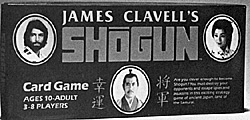
Designed by A. Shipps
Shipps, Ltd.
Box 2279, Lincoln, NF 68502
Release Date: August, 1984
Catalog No. 83558
Price: $12.95
Complexity: Beginner to intermediate
Solitaire Suitability: Low
Rating: ***
Shogun is a card game derived from poker with flavoring drawn from Paramount television miniseries based on James Clavell's book of that name.
Each player receives one down card, and then fills his hand with four more up cards by a process of passing or keeping cards as they are dealt around the table. The object is to complete a Class Run (similar to a flush in poker) or to put together cards of a kind (pairs, triplets, etc.).
There are two Classes: the Samurai (ruling) Class and the Peasant Class. The single Shogun card is the highest valued member of both classes. Each card has a numerical value; hands are scored by the sum of your matching cards. An end-of-hand strategy allows you to go for double or nothing with your score. There are two wild cards in the basic game and five more in the advanced game, each affecting play in a different way.
The deck consists of 44 class cards, 7 wild cards, and 24 half-card "strategy markers." The cards are printed on high quality linen poker stock, and come in a 5 x 10 inch embossed cardboard box. The rules run 2 pages long.
My overall impression is that the designer took poker, stirred in a few touches of gin, and then sprinkled the whole thing with licensed icing from Clavell and Paramount. I enjoyed playing the game, but the various twists and interactions of the wild cards that had to be puzzled out made it seem more effort than it was worth. The additional cards of the advanced game subtracted more than they added-playing the basic game without them was more fun.
Shogun is a simple game, playable with just a five- or ten-minute introduction. Playing with the added wild cards felt like adding one-eyed jacks and hi-lo to a basic five- card draw in poker. They require you to sit back and work your way through a hand, step by step, when play should be flowing rapidly.
The rules are reasonably organized, although at times the wording is somewhat awkward. Trying to work in all of the wild card interactions would probably be confusing no matter how well organized the rules were. I'm still not sure what should happen if the Emperor and the Jesuit Priest combine for Bad Karma, and the Ninia is added to the hand. Luck and strategy have an equal hand in the outcome; good karma as well as good sense are required to win.
My two biggest complaints about Shogun deal with its authenticity and its price. James Clavell's name is prominently featured, along with photographs of Richard Chamberlain and Toshiro Mifune on both the boxtop and some of the cards.
However, I never felt that the book or the mini-series was being brought to life by any aspect of the game--rather, it seemed that pictures and labels were being pasted onto an otherwise unrelated game to improve its appeal. The price frankly, is high unless you place a premium on component quality.
Because of these last points, I can't recommend the game for everyone. It's a nice, enjoyable game, even if it doesn't have much to do with 17th-Century Japan.
More Reviews
-
Game Review: RuneQuest
Game Review: Star Trek: The Role Playing Game
Game Review: Toon
Game Review: Battle Above the Earth
Game Review: Paranoia
Game Review: Tsathogghua
Game Review: South Mountain (ACW)
Game Review: Shiloh (ACW)
Game Review: Third World War
Game Review: Boots and Saddles ('80s Air Cav)
Game Review: Axis and Allies (WWII)
Game Review: 8th Army: Operation Crusader
Game Review: James Clavell's Shogun
Game Review: King Hamlet
Game Review: Grass
Game Review: Hack 'N' Slash
Back to Table of Contents -- Game News #1
To Game News List of Issues
To MagWeb Master Magazine List
© Copyright 1999 by Dana Lombardy.
This article appears in MagWeb (Magazine Web) on the Internet World Wide Web.
Other military history articles and gaming articles are available at http://www.magweb.com